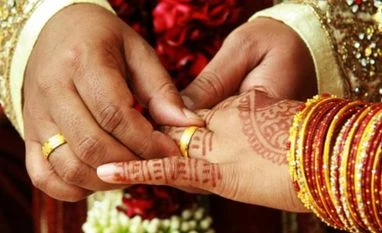President Mamnoon Hussain on Sunday gave his approval to the Hindu Marriage Bill, 2017 on the advice of Prime Minister Nawaz Sharif, turning it into law.
The law aims to protect marriages, families, mothers and their children and safeguard the legitimate rights and interests of Hindu families. It is a consolidated law for solemnisation of marriages by Hindu families residing in Pakistan, according to a government press release.
Nawaz Sharif said the government was focused on the provision of equal rights to minority communities residing in Pakistan. "They are as patriotic as any other community and, therefore, it is the responsibility of the state to provide equal protection to them," he said.
The passage of the bill will enable Hindu families able to solemnise marriages in accordance with the customary rites, rituals and ceremonies. The law also provides for procedures relating to restitution of conjugal rights, judicial separation, void and voidable marriages, termination of marriage,
The law also provides for procedures relating to restitution of conjugal rights, judicial separation, void and voidable marriages, termination of marriage, the financial security of spouses and children, alternate relief in termination of marriages, and termination of marriage by mutual consent.
It also provides divorcees with the right to marry again, the entitlement of remarriage by a Hindu widow at her own will and consent after the stipulated time, and the legitimacy of children.
Marriages solemnised before the law comes into effect will be retroactively validated, but family courts would need to be petitioned for the relevant registration and documentation.
More From This Section
The law also provides for punishments of imprisonment and fines up to Rs100,000 or both for contraventions. All offences under the law shall be non-cognisable and non-compoundable and can be tried by a first class magistrate.
On March 10, the National Assembly unanimously passed the Hindu Marriage Bill, 2016 by endorsing amendments made by the Senate in February. A day earlier, the bill was moved by Human Rights Minister Kamran Michael.
)